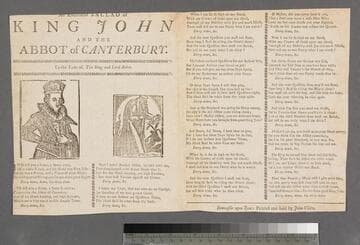Rare Books
The Equivalent for fasting or A Consecrating Fee. A new Ballad, on the Bishop of London's refusing to partake of a Treat, after consecrating The new Church in Spring Garden but accepting a larger silver Cup. To the tune of The Abbot of Canterbury
You might also be interested in
Image not available
The Lincoln's-Inn 'squire; or, the Protestant turn'd Papist. A new ballad. To the tune of, The King and the abbot of Canterbury
Rare Books
Imprint: [Dublin, 1730?] First line: I'll tell you a Story, a Story anon, View the Huntington Online Catalog record. Printed.
143250
Image not available
A Scheme to Abolish Mariage and propagate Whoreing by Act of Parliam't proposed by some of the Rt. Revd. Bench of Bishops. A Ballad to the Tune of Packington's pound
Rare Books
First line: I'll tell how the Bishops assembling of late Manuscript.
143198-143259

An excellent ballad of King John and the abbot of Canterbury. To the tune of, The king and lord abbot
Rare Books
ESTC T33696 ; Range of publication dates from the Bodleian Library Ballads database. ; Verse - "I will tell you a story, a story anon,". ; Printed in four columns with the title and two woodcuts above the first two with lines of ornamental type between the first two columns as well as the third and fourth columns.
289757
Image not available
A new ballad occasioned by a late edict of the Pope, for taxing and limiting ye publick stews at Rome to ye tune of you fair ladys &c: The Ladys of Dency to those at Rome greeting
Rare Books
First line: To all our Sisters now at Rome- Manuscript.
143198-143259
Image not available
Swift, Jonathan, 1667-1745. Advice to a Parson. An Epigram. By Dean Swift
Rare Books
First line: Wou'd you rise in the Church, be stupid and dull, Manuscript.
143198-143259
Image not available
An Excellent new Ballad on the Whiggs Lamentation occasioned by a Sore of their owne scratching to ye tune of Commons & [Peers]
Rare Books
First line: Att a sessions of late … Manuscript. Described in William Robert Wilde The Closing Years of Dean Swift's Life (1849) as referring "to the period between the viceroyalty of the Earl of Wharton in 1711, and the death of Queen Anne in 1714, when the Duke of Ormonde was Lord Lieutenant" (page 154).
143198-143259